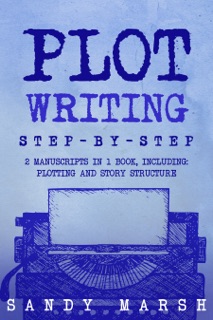2 Manuscripts in 1 Book, Including: Plotting and Story Structure!
Book 1)
Plotting: Step-by-Step | Essential Story Plotting, Conflict Writing and Plotline Tricks Any Writer Can Learn
Your 'Why' for Writing, Will Also Be Their 'Why' for Reading
Are you struggling to take your story to the next level? Would you like to know the best ways to create intrigue and have your readers rave about your book? Plotting is a step-by-step guide that takes you through the process of developing compelling plots from beginning to end.
With tips and tricks taken straight from professional writers, the novelist will learn how to use plotlines for maximum effect, while retaining creative freedom.
Making Conflict Real
Plotting helps the author weave suspense through improved conflict-writing, centered around a developing plot. Characters are challenged, affected and emerge changed in ways that infuse emotions in your readers, so that they cannot help but be personally invested in the welfare of your protagonist.
Marsh explains in concise straightforward language and with clear examples, the benefits of knowing where you are going with your novel; where the plotline starts (exposition) to how it ends (resolution) and how working with an overview, helps to captivate readers in terms of the lessons learned and the experience of life through the eyes of your characters.
Book 2)
Story Structure: Step-by-Step | Essential Story Building, Story Development and Suspense Writing Tricks Any Writer Can Learn
Shape Your Story Like a Pro
If you have a phenomenal story to tell but find you can't quite make it flow or form in a natural, yet moving way, Story Structure will transform your approach to writing and make your novel a compelling and addictive read.
Crammed full of tricks and tips to help both beginner and advanced authors complete their books in an enticing way.
Get Your Acts Together!
Each chapter is dedicated to one aspect of story structures, and begins with a 9-Step Process to dividing up your tale; which includes:
STEP ONE: The First Act - Introducing characters & what is at stake
STEP TWO: The First Major Plot Point - How to leave readers wanting more
STEP FIVE: Second Half of the Second Act - The need to support the protagonist
STEP SEVEN: Third Act - Protagonist is forced to face the enemy before being ready
Marsh uses examples to drive home how developing a strong story structure is important to help maintain focus, enrich plot ideas and provide a bird's-eye view of whether your novel is working.
You have made an excellent decision by choosing to learn more about plot writing. So, don't delay it any longer. Take this opportunity and purchase your copy today.
Order "Plot Writing" Now!



















































